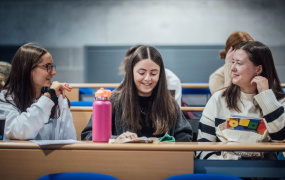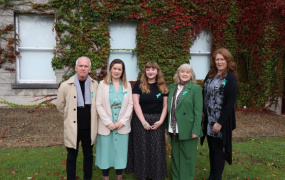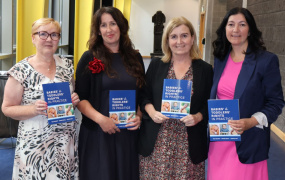Psychology
About
Psychology can be taken as part of the MIC Arts Degree as a joint honours combination.
Note: Approximately 25 places are available in second year. In the event of competition for places in second year, examination performance in Psychology in first year will be the determinant.
Almost everything we think, feel or do falls under the umbrella term of Psychology. To study Psychology is to enter a world where our thoughts, feelings and behaviour are explored from many perspectives. If you are interested in the answer to the following questions, then Psychology is for you
- What causes depression?
- Can you tell if another person is lying?
- Do physically attractive people have more fun?
- How does our memory work?
- Does being outdoors make us happier?
- What makes a good parent?
This four-year full-time honours degree provides a broad introduction to the discipline including coverage of the core areas of psychology and its associated methods required for accreditation by the Psychological Society of Ireland and the programme is currently accredited
Psychology is offered at many colleges and universities across Ireland so why choose MIC? At MIC, students studying Psychology are part of a small but very supportive community who have access to dedicated state-of-the-art facilities, including a dedicated computer lab, testing rooms, one-way observation facilities and an eye-tracking lab. Importantly and quite uniquely psychology students at MIC also benefit from third year placements in applied settings where they can test the theory and research they are learning in lectures on real world contexts and begin to build networks for post-graduation careers.
In Year 1, two introductory modules provide students with the foundations for studying Psychology, one in each semester. In semester 1 students will gain insight into many topics in Psychology including the biological basis of behaviour, the multiple layers of human development, and the different perspectives that underpin theories of human cognition, personality, and individual differences. Students will acquire basic skills in the scientific and ethical research practices employed by psychologists in the study of human behaviour, and the critical capabilities for evaluating information and claims.
In Semester 2, students undertake a more in-depth look at social psychology, which is the study of the behaviour of individuals in groups. This fascinating area covers topics such as the self-concept, social identity, and the influences that individuals exert on each other as group members. The module looks at social relationships, both within a group and between groups, and explores the impact of group dynamics on group performance in a variety of real life settings.
Both Year 1 psychology modules illustrate theoretical concepts and their applications with multiple examples drawn from everyday life and make first year psychology a vibrant introduction to this fascinating subject. Students who meet the Year 2 entry requirements can go on to specialise in Psychology and will study, not only existing knowledge of the processes and factors that influence human and other animals’ behaviour, but also the techniques that psychologists use to probe that behaviour, from unconscious thoughts to the most explicit of actions. The programme covers a wide range of areas including social psychology, cognitive psychology, developmental psychology, mental health and ill health, health psychology, and sports psychology.
.
Professional Psychology Training Routes (Clinical/Forensic/Educational/Health/Occupational/PhD)
- Social or community service management
- International business
- Human resources
- Training and development
- Education
- Marketing
- Management
- Health Service and charities
- Doctorate in Educational and Child Psychology
- MA/PhD Research
- About







